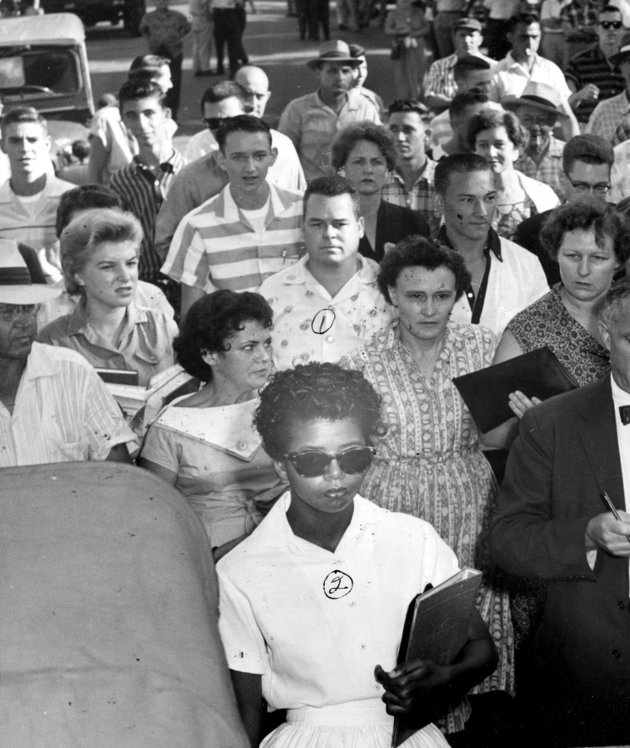
At the the Iowa Democratic forum on Monday night, Hillary Clinton took one of the easiest questions lobbed her way -- Who is your favorite president? -- and blasted it right into the back of her own goal.
She did fine with the first part, naming Abraham Lincoln, but then dipped into the history of Reconstruction, bemoaning the vengeful way in which the North targeted the South after Lincoln's assassination.
You know, he was willing to reconcile and forgive. And I don't know what our country might have been like had he not been murdered, but I bet that it might have been a little less rancorous, a little more forgiving and tolerant, that might possibly have brought people back together more quickly.
But instead, you know, we had Reconstruction, we had the re-instigation of segregation and Jim Crow. We had people in the South feeling totally discouraged and defiant. So, I really do believe he could have very well put us on a different path.
I did a double take when I heard this, because I had just spent the weekend recording a podcast with Michael Render -- known professionally as the rapper Killer Mike -- on the history of Reconstruction. (You can sign up here to get it when it's released. Render is now a backer of Sen. Bernie Sanders (I-Vt.), who is neck and neck with Clinton for the Democratic nomination, but when we first began working on the project several months ago, he had no particular allegiance.)
That Clinton still apparently believes in the myth she relayed -- and, more to the point, doesn't sense any political harm in purveying it -- shows just how important telling the actual history is.
After the Civil War, freed slaves were given the right to vote, and people who participated in the rebellion were temporarily barred from the ballot. The Union army was used to assure that the elections would be honored. Imagine if a big chunk of today's Republican Party was blocked from voting, and you can get a sense of the political leaning of the Congress, legislatures and governors in power immediately after the war. Congress passed a Civil Rights Act and a series of sweeping and, for the time, radical Constitutional amendments. For the first time, legislatures in the South created public schools and put an effort into public health. The Democratic Party of the time settled on a path of obstruction, determined to undermine the Reconstruction legislatures. The white supremacists chose that path not because Reconstruction was failing, but because they were afraid it would work.
Describing what came next as "rancorous" is like calling what happened to Hiroshima unpleasant. Tens of thousands of people were murdered in a terrorist campaign aimed at retaking power. And when the white elite did regain power, they didn't let go of it until the next civil rights movement forced their hand to let loose -- and in many ways they hold on today.
In real life, freed slaves were not passive victims of Klan violence, but fought back in ways both organized and spontaneous -- a resistance that never died, even in the darkest days of Jim Crow.
One of the historians we spoke to for the podcast, Douglas Egerton, put it this way: "Reconstruction didn't fail in the South. It was killed. It was murdered."
After the murder, Southern elites immediately began rewriting the history, blaming African-Americans and radical Republicans for pushing too hard. The idea was created that if only the white South had been asked nicely, rather than forced at gunpoint, it would have ushered in an era of harmony. As Clinton said Monday night: "I bet that it might have been a little less rancorous [if Lincoln had lived], a little more forgiving and tolerant, that might possibly have brought people back together more quickly."
As Ta-Nehisi Coates put it in The Atlantic, "Clinton, whether she knows it or not, is retelling a racist -- though popular -- version of American history which held sway in this country until relatively recently."
Clinton's senior spokeswoman, Karen Finney, said Clinton talks frequently about today's injustices, including attempts to suppress voting rights that "go back to racist efforts against Reconstruction."
"Her point was that we might have gotten to a better place under Lincoln's leadership," Finney said in an email. "What we needed after the Civil War was equality, justice, and reconciliation. Instead we saw the federal government abandon Reconstruction before real change took hold, which ultimately led to a disgraceful era of Jim Crow. "
Clinton spent many of her formative years in politics in Arkansas, where segregationist and white supremacist politics dominated far into the 20th century. In 1974, when Bill Clinton first ran for Congress, he forged a link with one of the best-known segregationists in the South, former Arkansas Gov. Orval Faubus, who authored the infamous line: "Segregation now, segregation tomorrow, segregation forever."
It was Faubus who, in 1957, defied the U.S. Supreme Court's Brown v. Board of Education decision and ordered the National Guard to block nine schoolchildren from entering Central High School in Little Rock. President Dwight Eisenhower called in the military in a historic showdown.

In June 1974, a few months before Clinton would narrowly lose his congressional bid, he sat down for an interview with an oral history project. Reaching out to the notorious segregationist was just good politics, he told the interviewers.
"When did you build this friendship with Faubus?" one asked.
"When I got ready to run for Congress," Clinton answered.
"But wouldn't he be the last guy to go see, represented the old time machine?" the interviewer pressed.
"No, no. See, that's why I got elected. Because I don't do things -- I don't think in terms of that," Clinton said.
"But wouldn't the liberal mind, whatever it is in this district, think that way?"
"Well, the liberal mind might, but I don't have a liberal mind, I guess, if that's the way they think. It's a matter of politics and how you get votes," Clinton said of doing his dance with white supremacists. "Faubus has a fine mind and a lot of influence in these hills, these people, and knows things that are worth knowing. The reason that they will vote for me, if they do, the people, even if they think that I'm liberal, whatever that is, is that I'll sit down with all these people and talk to them."
With Hillary Clinton's formative political culture steeped with white supremacy, it shouldn't be surprising that she absorbed its interpretation of Reconstruction and the history of the last 150 years in the South.
The North, though, has its own confused approach to Reconstruction history, which is also visible in Clinton's comments. In real life, freed slaves were not passive victims of Klan violence, but fought back in ways both organized and spontaneous -- a resistance that never died, even in the darkest days of Jim Crow. Even after the North left, the "rancour" continued, because African-Americans refused to accept a status of second-class citizen. And so, in some ways, it wasn't up to Lincoln. And that's the story we'll tell in the podcast "Killer History: Reconstruction," which launches in February.

- Publish my comments...
- 0 Comments
